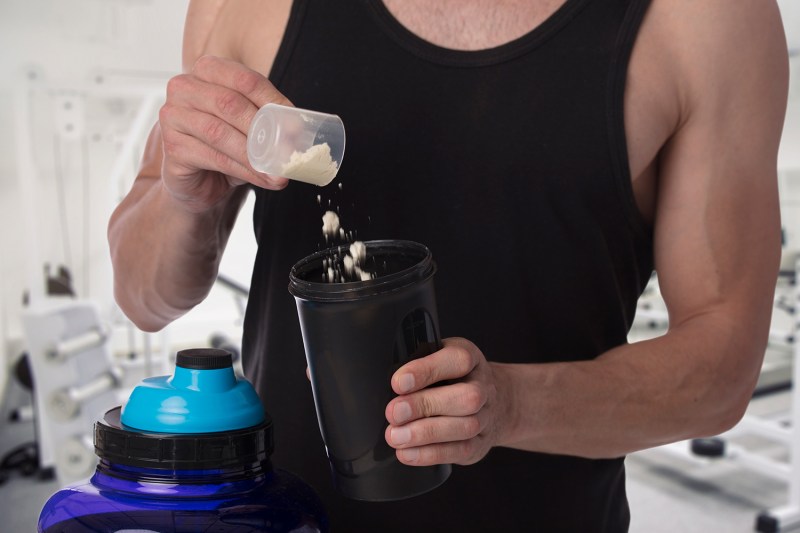Collagen protein has gained popularity in recent years for its benefits in skin health, joint support, and overall recovery. But does collagen protein build muscle? As a trainer and nutritionist, this is a common question I receive from my clients who are trying to build muscle: Does collagen protein work as well as other powders?
While collagen is a valuable protein source, it differs significantly from traditional muscle-building proteins like whey or casein. Understanding its amino acid profile and how it functions in the body is key to determining its role in muscle growth.
Below, we’ve broken down collagen protein’s benefits, including whether collagen contains the right amino acids for muscle gain, and how to optimize your results. Continue reading to learn more!
What is collagen protein?

Collagen is the most abundant protein in the body and is an important structural building block for connective tissues like skin, bones, tendons, ligaments, and cartilage. Collagen’s structure is unique, as it’s mostly made up of three long chains of amino acids (mostly glycine, proline, and hydroxyproline) that twist together to form a sturdy, triple-helix.
This configuration gives collagen its impressive tensile strength and elasticity, helping tissues resist stretching and damage. There are many types of collagen, but the most common ones are Types I, II, III, and IV. According to a 2023 PubMed paper on collagen, Type I is the most prevalent in skin, bone, and tendons — it makes up more than “90% of all the collagen in the human body.”
Does collagen contain amino acids?

Collagen does contain amino acids. As we discussed above, the protein mainly comprises three long chains of amino acids — glycine, proline, and hydroxyproline. The problem, however, is that collagen does not contain all nine essential amino acids.
Essential amino acids are those that your body has to get from external sources (food) because it can’t produce them independently. These amino acids are important for muscle growth because they instigate some of the processes that cause hypertrophy. In fact, optimal muscle growth requires the presence of all nine essential amino acids.
Protein sources with all the essential amino acids are called “complete proteins,” and most animal protein sources bear this tag. Collagen, however, does not meet the qualifications, as it contains all the essential amino acids except tryptophan. So, while collagen contains amino acids, it doesn’t have all the amino acids essential for muscle building.
How much protein is in collagen?

In collagen supplements, especially in hydrolyzed collagen or collagen peptide powders, the product is typically around 90% protein by weight. This means that a typical 20‑gram serving of collagen powder will deliver roughly 18 to 20 grams of protein.
It’s important to note that although collagen is a protein, its amino acid profile is unique; it’s especially rich in glycine, proline, and hydroxyproline but doesn’t contain all the essential amino acids in balanced amounts like complete proteins (such as whey). This makes collagen particularly valuable for supporting connective tissue, skin, and joint health, but complete proteins are better for muscle building.
Does collagen protein build muscle?

Collagen protein alone is not the most effective for muscle building. However, research suggests it can support muscle gain when combined with resistance training and a well-rounded diet. A 2015 study divided 53 elderly male participants who had sarcopenia into two groups for 12 weeks: a collagen supplementation group and a placebo group.
At the study’s end, researchers concluded that older men who supplemented with collagen while performing resistance exercises improved muscle mass and loss in fat mass compared to a placebo group.
For optimal muscle growth, collagen should be used alongside complete protein sources such as whey, casein, or plant-based proteins that contain all essential amino acids.
Other tips for seeing muscle gains

- Focus on resistance training: Engage in structured resistance exercises with progressive overload. This training approach is key for stimulating muscle growth, while collagen supports connective tissue health.
- Maintain a balanced diet: Include a variety of nutrient-rich foods such as fruits, vegetables, whole grains, and lean proteins. A balanced diet fuels workouts and recovery, helping your muscles grow.
- Prioritize complete proteins: Ensure your diet includes high-quality protein sources like lean meats, eggs, dairy, and legumes.
- Get enough total protein: For muscle building, aim for at least 0.7 to 1 gram of protein per pound of body weight daily.
- Prioritize recovery: Ensure you get enough sleep and hydration. You could also include stretching or mobility work. Recovery is essential for muscle repair and overall growth.
- Monitor your progress: Regularly track your training and dietary habits to make necessary adjustments. This will help you optimize your exercise routine and nutritional strategy over time.
Frequently asked questions

Is collagen or whey protein better?
Whey protein is superior for muscle growth because it is a complete protein with a high leucine content, directly stimulating muscle protein synthesis. Collagen is beneficial for joint and connective tissue health but lacks all the essential amino acids for muscle-building.
Which protein is best for muscle growth?
Complete proteins such as whey and casein and high-quality plant-based options like soy or pea protein are the best proteins for muscle growth. These proteins contain all the essential amino acids necessary for muscle repair and hypertrophy.
Does collagen protein count toward protein intake?
Collagen counts toward total protein intake, but it should not be the primary source for muscle building. Collagen should be supplemented with complete protein sources that provide all essential amino acids to maximize gains.




